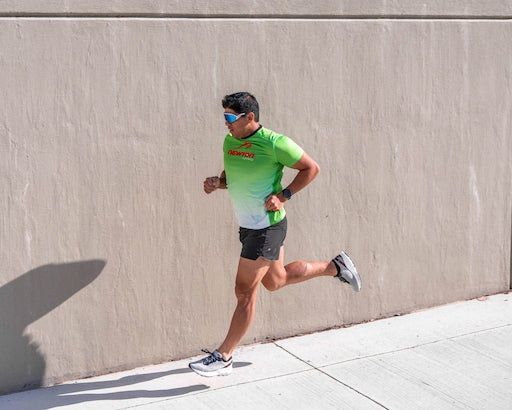
Exercise and Mental Health
training tips22 July 2020
By – Dr Justin Ross – clinical psychologist in Denver, CO, specializing in human performance.
“Running is my therapy” is a statement I hear frequently from athletes across age, gender, culture, and experience level, cutting across a wide swath of demographics. Although running, and exercise more broadly stated, offers many therapeutic components, it is not a replacement for counseling or therapy, there is something powerful behind this statement. Regular exercisers can attest to the power of movement on mood, emotional well-being and mental health in general. Researchers are beginning to look more closely at the links between exercise and the impact on our mental health, including the possible protective mechanisms for concerns such as anxiety and depression.
A number of comprehensive studies conducted in recent years show just how powerful exercise is for our mental health. Combing through exhaustive data sets, researchers can point to many connections and correlations that move our understanding from the anecdotal to the scientific. For example, one meta-analysis (a procedure that combines many studies into a single statistic to look at overall impact) found that people diagnosed with major depressive disorder were 50% more likely to not meet the minimum threshold of 150 minutes per week of moderate exercise as recognized as the gold standard by the World Health Organization (WHO). Conversely, several research studies documented consistent findings that those who did reach the WHO standard, and more specifically those who frequented vigorous forms of exercise, were much less likely to meet criteria for a depressive episode. Another meta-analysis included a sample size of 266,939 participants and found that consistent exercise reduced the risk of depression somewhere between 17 and 41 percent, with these protective effects being demonstrated across age, sex, and country of residence. Similar effects were found when looking at resistance training on anxiety, with one meta-analysis finding 16 such studies with 922 participants documenting significant improvement on anxiety symptoms for both healthy participants as well as those experiencing ongoing mental illness. Finally, another meta-analysis looked at 33 studies with a total of 1877 participants and found that resistance forms of exercise were associated with a significant reduction in depressive symptoms. I could keep reciting data here, but you get the point. Exercise helps our mental health. Period. And although the main targets for these studies seemed to focus on general forms of either aerobic movement or resistance training on either depression or anxiety, I would speculate that there is generalization to be made about nearly any form of exercise on mental health more broadly.
BUT HOW DOES EXERCISE HELP
We’ve heard all the physiological explanations before, from increasing dopamine and serotonin in the brain, to releasing endorphins and endocannabinoids. Other ideas point to impacting inflammation and oxidative stress markers in the body and aiding in the neuronal regeneration and growth in key parts of the brain. While all of those ideas may be true, researchers are still not 100% confident on the exact physiological matrix that makes exercise such a powerful mood booster and mental health aid. But maybe that level of in depth understanding is beside the point. The betterment in how we feel when we frequently engage in exercise is self-evident, and understanding the exact chemistry behind why we feel better may not be necessary. There is likely equally as much value in the impact on our psychological framework with exercise as there is on our chemistry.
CHANGING HOW WE THINK
One of the central tenets behind most therapeutic interventions aimed at improving mental health, including Cognitive Behavioral Therapy (CBT), is bringing awareness to and subsequently working on how we think. The way our mind works is critical to our mental health in general, with depression impacting our views of our self, our future, and our world. Anxiety tends to focus on concerns related to lacking trust or confidence about things working out in our favor. Both involve significant changes in how we perceive and narrate our lives, often turning our outlook into one of doom and gloom or potential catastrophe.
Athletic training done in a specific way fundamentally shifts our perception. And it’s this psychological impact that may serve as one of the key ingredients that improves our mental health. Mental health requires a healthy repetition of believing we are capable. Training provides a means in which this is objectively attainable on a regular basis, and affords us the opportunity to shift our self talk from a narration of “I can’t” to “I can.” Empowerment along with discipline are key protective factors in our mental health, and sport builds upon both of these factors.
Any endurance athlete knows that one of the most important sport psychology skills is learning how to tolerate discomfort. The willingness to endure the physical and emotional discomfort we purposefully pursue has a number of elements that are inherently self-satisfying. It’s this level of self-determination of using sport as a proving ground to see what we’ve capable of when (not if) we encounter discomfort, pain, and fatigue. If depression is a paucity of hope, sport requires you to muster both courage and determination to forge ahead. In turn, overcoming personally created challenges on both a daily basis in a training session and longer basis with a training plan bolsters self-esteem in the belief of success that extends from laps at the pool or from a century ride into other key parts of life.
What’s more, pursuing and ultimately achieving clearly defined goals in our endurance pursuits is fueled by our own personal meaning we give to sport. The medals hanging on our walls are symbolic, not just of crossing the finish line, but of the dedication required to stay on task for our own personal glory. Meaning and purpose are fundamentally central to psychological well-being are often missing for those struggling with mental health concerns. Although personal, athletic meaning is felt universally amongst other athletes as well. The sense of satisfaction in goal attainment rings just as true for someone qualifying for the Ironman World Championships in Kona to someone running their first 5km. The social understanding, connection, and camaraderie we forge with other athletes who understand the power of this process adds another protective psychological layer in feeling validated and understood by like minded others.
Researchers warn against thinking of exercise as a panacea for mental health treatment, while at the same time strongly endorsing it as a necessary treatment arm for those struggling with just about any mental health condition. It’s easy to see why.
Dr Justin Ross is a clinical psychologist in Denver, CO, specializing in human performance. He is a 2 time Ironman 70.3 Finisher and an 11 time marathoner, with 6 BQs and a personal best of 2:57. His newly launched course, Unlock Your Athletic Potential is a masterclass aimed at building fundamental psychological skills for sport is now available on the Insight Timer meditation app. For more information on sport psychology coaching, please visit: www.drjustinross.com.

